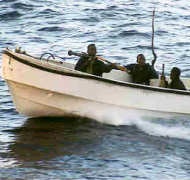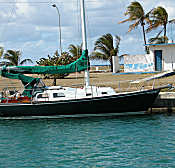 ABOVE:Somali Pirates
ABOVE:Somali Pirates
Today we’re going to take a brief detour into the law of piracy which, although not strictly an export law topic, is a legal topic of interest to many exporters, particularly if a ship carrying their exports gets nabbed by modern-day pirates off the Horn of Africa. The occasion for this salty detour is an article in today’s Wall Street Journal by David Rivkin and Lee Casey.
The starting point for the article is the hijacking of the Saudi oil supertanker by Somali pirates. Rivkin and Casey claim that the pirates are benefiting from a confusion about international law on piracy. This confusion allegedly makes it difficult for third-party nations to prosecute pirates when, and if, they are captured.
Capturing pirates is not the critical problem. Rather, the issue is how to handle those in captivity. … One solution would be for the capturing state to press charges based on the much misunderstood and abused principle of “universal” jurisdiction. This is the notion that any state may criminalize and punish conduct that violates certain accepted international-law norms. Although its application in most circumstances is dubious — there is very little actual state practice supporting the right of one state to punish the nationals of a second for offenses against the citizens of a third — piracy is one area where a strong case for universal jurisdiction can be made (if only because piratical activities often take place on the high seas, beyond any state’s territorial jurisdiction).
First, the authors’ notions that universal jurisdiction is appropriate because piracy often occurs on the high seas “beyond any state’s territorial jurisdiction” indicates that the authors don’t fully understand the various grounds for the exercise of extraterritorial jurisdiction, both on the high seas and elsewhere. When piracy takes place on a flagged ship, as is usually the case, that ship is considered the sovereign territory of the country which flagged it, so the piracy is not “beyond any state’s territorial jurisdiction.”
Moreover there are other accepted grounds for the exercise of criminal jurisdiction over pirates captured at see. International law recognizes the rights of countries to enforce their own criminal laws against their own nationals for extraterritorial crimes. This would give Somalia the right to prosecute the pirates at issue. The “passive personality principle” gives states the right to prosecute extraterritorial crimes committed by non-nationals against nationals of the prosecuting states. This principal would allow jurisdiction by countries over crimes committed against their own nationals in the course of the piratical activities. And some states, including the United States, have, I think questionably, asserted that the territorial principle of international jurisdiction would allow protection of goods and technology that have originated in their own states. Careful followers of U.S. export prosecutions will understand this as the basis of, for example, this indictment of a Dutch national for exporting U.S. aircraft parts from the Netherlands to Iran.
To compound their various misunderstandings of the principle of universal jurisdiction, Rivkin and Casey asserted in the quotation set forth above that “there is very little actual state practice supporting the right of one state to punish the nationals of a second for offenses against the citizens of a third.” This can only be explained by the apparent unfamiliarity the authors have with the basis of jurisdiction asserted by war crime tribunals convened after World War II. The Allied War Tribunals explicitly invoked “universal jurisdiction” given that the prosecuted crimes had not been committed against their own nationals or within their own territories. Israel’s prosecution of Adolf Eichmann also cited the principle of “universal jurisdiction.” In addition, that principle recently served as the basis for U.N. tribunals created to prosecute atrocities committed during the civil wars in Yugoslavia and Rwanda. An excellent discussion (and criticism) of the use of the “universal jurisdiction” principal in these and other war crime cases can be found in E. Kontorovich, The Piracy Analogy: Modern Universal Jurisdiction’s Hollow Foundation, 45 Harv. Intl. Law Journal 183 (2004).
The authors’ desire to see the universal jurisdictional principal to prosecute pirates appears to be motivated, at least in part, by their desire to see the U.S. capture and prosecute the new crop of 21st century pirates. The authors criticize the squishy concerns of our European allies for such niceties as due process and regular criminal trials, preferring instead to see the United States set up proto-military tribunals where the pirates can be subjected to some kind of summary procedure and then forced to dance the hempen jig, which is, if you haven’t brushed up on for Talk Like A Pirate Day is “pirate speak” for being hanged.
Aside from some apparent distrust of traditional due process, Rivkin and Casey argue that parties captured by the U.S. military can’t be subject to ordinary criminal trials because “criminals cannot be targeted with military force.” This would come as a surprise to everyone involved in the narcotics prosecution of Manuel Noriega who was captured by the U.S. military and returned to the United States for trial on narcotics charges in U.S. federal courts. Perhaps Rivkin and Casey are referring to the posse comitatus law, 18 U.S.C. § 1385, but that law was only intended to prohibit the military from being used for law enforcement purposes within the United States.
It seems to me that if the United States captures pirates on the high seas, the principal of universal jurisdiction would permit a prosecution for piracy under 18 U.S.C. § 1651. This is not because, as Rivkin and Casey argue, there aren’t other bases for jurisdiction over the pirates available but rather because the exercise of jurisdiction over pirates under the doctrine of universal jurisdiction is widely accepted by nations and scholars even where other bases of jurisdictions by other nations might be available.
However, there is no reason that such charges couldn’t or shouldn’t be prosecuted in federal court with all the protections normally accorded to any other criminal defendants. Frankly, such a prosecution shouldn’t find ordinary due process to be a hindrance to convict an individual, not listed on the crew manifest, who is found on a ship with an RPG launcher or an automatic assault weapon. I think a jury will make that guy walk the plank faster than you can say “Avast, me mateys!”


 Posted by
Posted by  Category:
Category: 

 Last week we
Last week we 

 After ABC News
After ABC News 

